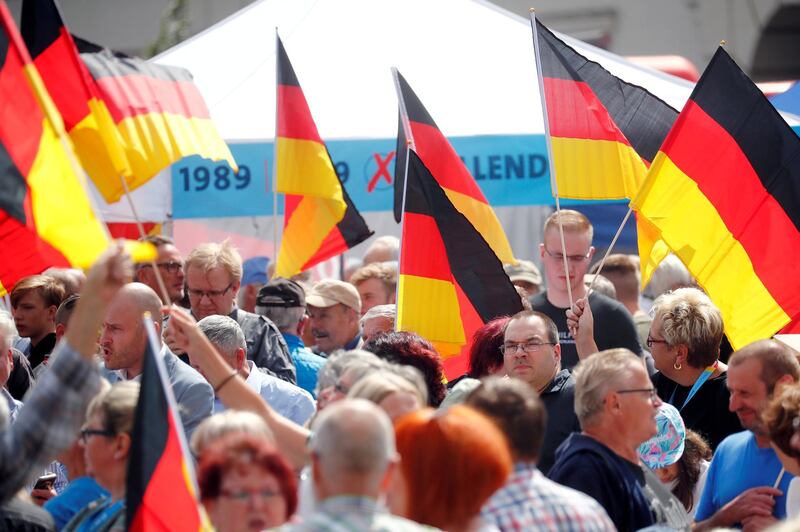Members of the far right Alternative for Germany (AfD) party returned from a controversial visit to Damascus this week claiming that Syria was safe enough for hundreds of thousands of refugees to return.
“Every Syrian citizen can return to Syria immediately,” Frank Pasemann, an AfD member of parliament who led the delegation including four other Bundestag representatives, told a press conference in Berlin on Tuesday.
“Especially in Damascus, life has returned,” Mr Pasemann said.
The visit to Syria by an AfD delegation – the second in two years – has been described by political opponents and human rights groups as a thinly veiled attempt by the anti-immigration party to make a case for sending Syrian refugees home.
Germany hosts more than 584,000 Syrians seeking asylum after opening its doors to some of the million refugees, asylum seekers and migrants who crossed into Europe in 2015 alone. The AfD capitalised on Chancellor Angela Merkel’s welcoming policy by harnessing xenophobic sentiments and real concerns about socio-economic issues – particularly in the former East German states.
The AfD said its delegation’s latest visit was to "assess concretely the situation in Syria in person” and discuss with officials “the situation surrounding the Syrian people and the current state of the peace process”.
Mr Pasemann and other members reportedly met with officials from the ministries of finance, tourism and foreign affairs. Syrian state media claimed the AfD delegation sought to “relay the truth about what is happening in Syria” to the German parliament and public.
During the AfD’s first visit to Syria in March 2018, delegation member Christian Blex posted on social media that women in Damascus could be seen “sitting in bars” and “wearing blue jeans, not veils”, claiming that it was a sight unimaginable in Berlin’s Neukolln district – a south-eastern suburb of the German capital that has become home to Turkish migrant workers and refugees fleeing conflict in the Middle East over the years.
Although such statements betray the AfD’s Islamophobic, xenophobic politics, it is not necessarily just Germany’s far right that want to discuss when, and how, Syrian refugees head home.
According to Till Kuster, Syria co-ordinator for Germany-based human rights and relief organisation Medico, “questions of return to Syria, and encouraging or forcing Syrians to return, is not only a political point that the far right makes”.
"In my opinion, this is a reaction to the more xenophobic political debate in Germany about refugees and the impact of integration – especially [regarding] Syrians, who represent the highest number," Mr Kuster told The National.
The influx of hundreds of thousands of Syrian refugees has also revealed differences between some of the 16 federal states as well as between ministries. The AfD does not lead any of the states, but in October came second to the Left Party in the eastern state of Thuringia.
Germany’s conservative interior minister, Horst Seehofer, suggested late last year that the ministry would “examine” a national freeze on repatriations of Syrian refugees after several states demanded that the policy be reviewed regularly. The freeze now requires renewal every six months.
Shortly afterwards, the German foreign ministry published an internal briefing warning that conditions in Syria were still not appropriate for return. While the briefing, meant to guide decision-making on asylum requests, remains classified, the ministry said it had documented a "complex, still difficult and volatile situation” in Syria.
‘Bizarre and shameful’
Since late 2016, the Syrian government and its allies have retaken whole swathes of the country through a combination of brute military force and gun-point evacuation agreements with besieged rebel areas. The Syrian government and its Russian backers regularly push a dubious narrative that the country is now safe. The war is as good as over, they claim.
United Nations agencies and human rights groups disagree.
While active pro-government frontlines are mostly restricted to the north-western provinces of Idlib and Aleppo, security forces continue to arbitrarily detain and disappear, torture and execute countless detainees, according to conflict monitors and rights groups. Reports point to returning refugees being disappeared upon arrival by security forces. The government is also punishing whole sections of the population by withholding international aid and dispossessing former rebel communities through reconstruction plans.
A recent Turkish-led incursion into north-eastern Syria, against Kurdish armed groups including in the US-backed Syrian Democratic Forces, also points to a far from stable security situation.
There are concerns, though, that AfD’s visits could subtly tilt the balance of an already precarious conversation back in Germany.
Medico’s Mr Kuster called it “bizarre and shameful” to see Bundestag members “speaking directly to members of the Syrian regime … about the safe and stable conditions under the Assad regime, [while] not mentioning the atrocities, violence and human rights abuses that happened during the nine years of conflict”.
He said the AfD’s visit “will first of all address their own supporters … but also have an impact on German society itself” as debates around integration of refugees and asylum seekers become increasingly charged.
“Not all people know about the situation in Syria,” said Mr Kuster. “So if they see German politicians visiting Syria and pushing strongly for return of refugees, I would guess many people will start adopting this position.”
A gauge of that effect might be seen next week, when officials meet to reassess the freeze on repatriations of Syrian refugees.







